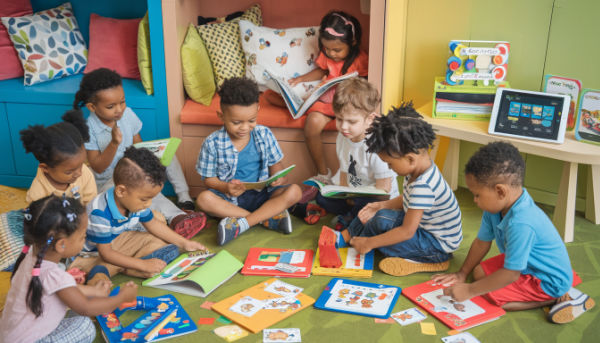Kindergarten Books: Storytelling for Imagination & Learning

Kindergarten books play a vital role in early childhood education, serving as a gateway to creativity and knowledge for young minds. These books are not just stories; they are tools that help children develop essential skills and spark their creativity. In this article, we will explore the significance of kindergarten books in a child’s development, the benefits of reading, how to choose the right books, and the role of educational materials in fostering a love for reading.
The Importance of Kindergarten Books
Reading to children from an early age is crucial for their development. Kindergarten books, in particular, have a big impact on a child’s imagination and learning abilities. Reading helps children build their vocabulary, improve listening skills, and understand the world around them. Here are some key benefits of reading to children:
- Imagination Boost: Stories transport children to different worlds, allowing them to explore new ideas and perspectives.
- Cognitive Development: Reading stimulates brain development, helping with problem-solving and thinking skills.
- Language Skills: Books introduce new words and phrases, expanding a child’s vocabulary and comprehension.
- Emotional Growth: Through stories, children learn about emotions and empathy, helping them understand and relate to others.
Incorporating kindergarten books into a child’s daily routine not only supports their educational journey but also nurtures a lifelong love for reading.
Choosing the Right Books for Kindergarten
Selecting the perfect books for kindergarten-aged children can be a fun but sometimes hard task. Books at this stage should be age-appropriate and engaging, capturing the imagination and interest of young learners. Here are some tips to guide you in making informed choices:
- Consider the Child’s Interests: Choose books that align with the child’s interests, whether it’s animals, fairy tales, or adventures. This keeps them engaged and eager to read more.
- Focus on Illustrations: Bright, colorful illustrations can captivate young readers and help them understand the story better.
- Simple Language: Books with simple, repetitive language patterns are ideal as they help children learn new words and phrases easily.
- Interactive Elements: Books with flaps, textures, or sound elements can make reading more fun and engaging.
- Diverse Characters and Stories: Ensure that the book selection includes diverse characters and stories to promote inclusivity and understanding.
For more detailed guidance, parents can explore resources such as how to choose just-right books for your child, which offers valuable insights into selecting the best books for young readers.
Kindergarten Learning Books: Building Blocks for Education
Kindergarten learning books play an important role in building basic skills necessary for a child’s educational journey. These books are designed to enhance literacy and numeracy, fostering a love for learning from an early age. Here’s how they contribute to a child’s development:
- Literacy Skills: Learning books introduce children to the alphabet, phonics, and basic vocabulary, setting the stage for reading proficiency.
- Numeracy Skills: Simple math concepts like counting, shapes, and patterns are often included, helping children develop essential math skills.
- Diverse Learning Styles: A variety of books fit different interests and ways of learning, ensuring that each child can learn in a way that suits them best.
- Encouragement of Critical Thinking: Many learning books include puzzles and questions that encourage children to think critically and solve problems.
Choosing a diverse range of books can fit different interests and ways of learning, making education a fun and engaging process for young minds. By incorporating these books into daily routines, parents and educators can lay a strong foundation for lifelong learning.
The Role of Kindergarten School Books in Classroom Settings
Kindergarten school books play a vital role in educational settings, providing a foundation for young learners. These books are carefully selected to align with curriculum goals and help teachers introduce new concepts. By incorporating storytelling and book discussions, educators can create an interactive learning environment that encourages curiosity and involvement.
Key benefits of using kindergarten school books in the classroom include:
- Curriculum Support: Books are chosen to complement lesson plans and reinforce key learning objectives.
- Interactive Learning: Teachers use books to spark discussions, encouraging children to express their thoughts and ideas.
- Imagination and Creativity: Storytelling helps children visualize stories, enhancing their creativity and imagination.
- Language Development: Exposure to new vocabulary and sentence structures aids in language acquisition.
Through the use of kindergarten school books, educators can create a dynamic classroom atmosphere that supports both individual and group learning experiences.

Kindergarten Workbook: Enhancing Learning Through Practice
Kindergarten workbooks are a valuable tool for reinforcing learning at home. These workbooks provide planned activities that help kids practice important skills, ensuring they retain what they’ve learned in the classroom. Early childhood educational materials are crucial for cognitive development.
Benefits of using kindergarten workbooks include:
- Skill Reinforcement: Workbooks offer exercises that reinforce literacy and numeracy skills.
- Independent Learning: Children can work through activities at their own pace, fostering independence.
- Parental Involvement: Workbooks provide an opportunity for parents to engage with their child’s learning journey.
- Variety of Activities: Diverse exercises cater to different learning styles and keep children engaged.
By incorporating kindergarten workbooks into daily routines, parents can support their child’s education and help them build a strong foundation for future learning. For those seeking additional resources, options like these educational tools can further enhance their child’s learning experience.
Books for Kindergarten: Encouraging a Love for Reading
Fostering a love for reading in young children is a wonderful way to set them on a path of lifelong learning. Here are some effective strategies to encourage this passion:
- Create a Reading Routine: Establish a regular reading time each day. This could be before bedtime or during a quiet afternoon. Consistency helps children look forward to this special time.
- Be a Reading Role Model: Let your children see you reading. Whether it’s a book, magazine, or newspaper, your example will inspire them to pick up a book too.
- Interactive Storytelling: Make reading interactive by asking questions about the story and characters. Encourage your child to predict what might happen next.
- Visit Libraries and Bookstores: Regular visits to libraries or bookstores can be exciting adventures. Allow your child to choose books that catch their interest.
- Incorporate Books into Play: Use books as part of playtime. For example, acting out stories or creating crafts related to the book can make reading more engaging.
- Celebrate Reading Milestones: Celebrate when your child finishes a book or reaches a reading goal. This positive reinforcement can motivate them to read more.
By integrating books into daily life, children learn to associate reading with enjoyment and discovery, laying the groundwork for a lifelong love of books.
Conclusion
In summary, kindergarten books play a crucial role in a child’s development by sparking imagination and enhancing learning. They help build foundational skills and support educational goals both in the classroom and at home. By thoughtfully selecting and utilizing these books, parents and educators can nurture a child’s curiosity and love for reading.
Investing time in choosing the right books for kindergarten-aged children is an investment in their future. As they grow, these early experiences with books will support their academic and personal growth, fostering a lifelong passion for learning.





